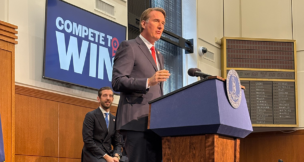Orange is the new blue (not quite)
Virginia Business //January 29, 2015//
It appears former Gov. Bob McDonnell will be trading the role of His Excellency for a prison jumpsuit this month. A U.S. federal court judge denied his request to remain free while McDonnell appeals his conviction on 11 corruptions charges, which netted him a two-year prison sentence.
Regardless of the pending arguments in this case, some have concluded all too quickly that the lack of ethics in government is a Republican problem. Hold on; not so fast!
Despite the satirical nod above to the title of the popular Netflix series “Orange is the New Black,” there’s no correlation between prison jumpsuits and the color of one’s political party.
Opinions over the McDonnell case are largely divided. Should he have been prosecuted at all, much less sentenced to two years in federal prison? On the other hand, it is arguable that many in the general public would have viewed a sentence of community service as predictably light, especially coming at a time when communities across the country are roiled over how race and socio-economic status factor into our criminal justice system.
McDonnell’s lack of acceptance of responsibility has generally been seen as a negative. But unlike many of his character witnesses, one ought to at least give the former governor credit for asking for the court’s mercy on his co-defendant wife, Maureen.
To some, McDonnell’s two-year sentence was arguably lenient, for others there will always be a belief that the entire case has been an unwarranted and partisan prosecutorial witch-hunt.
Despite any misguided partisanship, the hypothesis that one party or the other holds an ethical high ground turns out to be false. Reports from a variety of sources show that both Democrats and Republicans have run afoul of the law.
Most of the data that have been collected focuses on members of the U.S. Congress. A 2013 report on the most corrupt members of Congress by Citizens for Responsibility and Ethics in Washington (CREW) alleged serious ethical misconduct or conflicts of interest by 17 members of Congress, 11 of them Republicans and seven Democrats. None were from Virginia.
Tracking the ethical lapses of state and local politicians is sadly an enormous undertaking. According to a report from the U.S. Justice Department, more than 20,000 public and private individuals have been convicted of corruption over the past two decades and more than 5,000 more cases still are awaiting trial.
The State Integrity Investigation, a project of the Center for Public Integrity, ranked all 50 states in its 2013 Corruption Risk Report Card (released before McDonnell’s indictment). All states were graded A through F based on 330 “integrity indicators” across 14 categories of state government.
Rather than tracking indictments or convictions, the investigation made an assessment of laws in place to ensure political integrity and the degree to which such laws are effectively being enforced. In the 2013 report, not a single state received an A grade; only five earned B’s. Nineteen states received C’s and 18 received D’s. Eight states scored failing grades. Virginia was ranked 47th among the 50 states with a numerical score of 55 percent and an overall grade of F.
An excerpt from the report’s narrative: “Virginia has long prided itself on ethical government, but the state’s lax oversight rules, weak consumer representation protections, dwindling capital press corps and coziness between political and economic elites, have all combined to undermine the validity of that self-image. Meanwhile, the few ethics and disclosure requirements that do exist tend to be flawed, limited or fraught with exemptions.”
While there are many ways in which government is unlike business, let’s briefly reflect on some standard accounting controls practiced by the business community. These include a chain of approval for expenditures, adequate segregation of financial duties, document retention, standardized reporting across all business segments and the creation of an audit trail for financial statements.
These processes and procedures exist to protect the business against fraud, regardless of the individuals involved in handling cash receipts, disbursements or other company records. Good accounting controls are not personality based, nor are they a self-policing system.
Our politicians would do well to take note of the value of such practices. For too long, Virginia has relied on the integrity of the individuals involved in politics rather than the quality of its systems and processes.
Virginia’s part-time lawmakers have one of the shortest meeting schedules in the country, 60 days in even-numbered years and 30-days in odd numbered years.
Regardless of what happens in the appeals process, Bob McDonnell will occupy the unfortunate place of being the first governor of Virginia to be charged with corruption.
The fact that McDonnell’s actions were found to be illegal under federal law, but not under state law, provides even more reason to reconsider the adequacy of Virginia’s ethics laws. This year, the General Assembly is in one of its short sessions. Simply limiting gifts won’t do much to fix a system known for its loopholes, exceptions and inadequacies. Let’s hope our lawmakers can find the time to do more.
C














